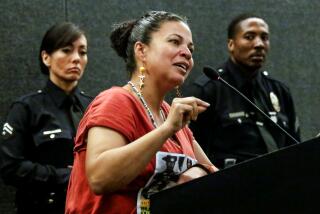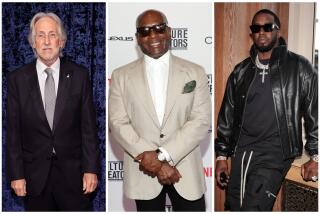Column: The Jussie Smollett story is not just about Jussie Smollett. It’s about us
This is not a column about Jussie Smollett. I do not know the man except as a star of “Empire,” cannot confirm what he did or did not do, have no idea why he or anyone involved would or wouldn’t do such a thing. Just like, you know, most of America.
I know Smollett has been charged with, which is not to say convicted of, making a false police report in which he claimed he was assaulted in ways that seemed to indicate a hate crime. I know that Smollett continues to deny this and that the Chicago police chief appeared sure enough of his case to publicly condemn the actor for smearing the reputation of his town, which is not something I had realized Smollett had done.
But why shouldn’t the police chief put a personal spin on the story? For weeks, every media platform available to humans in 2019 has experienced a Grand Mal seizure as millions vented their changing but strongly held convictions and others made political hay of it all.
From the moment police released details of the report Smollett filed on Jan. 29, in which he claimed that he had been attacked by two men yelling racist and homophobic comments who put a rope around his neck, chemicals on his skin and yelled “This is MAGA country,” many, many people were deeply upset. About a lot of things. Racism, homophobia, the president’s reluctance to call out white supremacists, and, apparently, the notion that Chicago is a place where a hate crime could occur.
Which makes sense. The report of the alleged attack was deeply upsetting for all of those reasons. We are living, after all, in a post-Charlottesville America. en reports of white supremacists marching with torches on the campus of the University of Virginia emerged a year and a half ago, it seemed unbelievable. But it was happening and only got worse.
In light of such things, the fact that a young black gay man known for his portrayal of same on a hit show saying he had been attacked by men voicing similar sentiments seemed shocking but believable.
FULL COVERAGE: Jussie Smollett »
In Charlottesville, Va., however, the reports were quickly, and tragically, verifiable. The actions Smollett reported to the police were not. A crime report is not fact; it is a report that requires investigation, and police investigations take time.
And time is not something we have any patience with any more.
Moments after the report was made public, the outrage machine known as social media hit Defcon 1. Having learned nothing from the walked-back accusations made against Covington (Ky.) High students, many folks, including a few prospective presidential candidates, jumped on the MAGA reference and denounced the attack as proof of the culture of hate that the president’s campaign slogan represents.
News media quickly reported the reaction and the punditry class raced to catch up.
Except, of course, there was at the time no proof, of the comment or the attack. And, for the record, there is still no public proof of anything, save our increased willingness to make definitive public proclamations about situations that we literally know nothing about.
“Willingness” may actually be too timid a word — social media, and its increasingly intimate relationship with news media, demands that people with a presence on either weigh in immediately on potentially incendiary issues with escalating amounts of fury. Those who don’t, risk being condemned as cowardly or somehow complicit.
Where is your outrage?? How can you ignore an important story about which few facts are known?
For a culture that still devours detective novels and police procedurals at an alarming rate, that has resurrected Sherlock Holmes in a half-dozen modern guises, we are quick to dispose of the guiding principal of the genre: Do not theorize without sufficient data.
We are doing it even now. Many folks are tripping over themselves to walk back earlier comments, confessing that the story actually seemed a bit fishy to them at the time. Others are using the story’s latest twist to decry “identity politics” and “the culture of victimization.”
As if racism, homophobia and hate crimes were a myth. Hate crimes happen. Charlottesville happened. But wearing a MAGA hat is not a crime, and people do so for a variety of reasons just like people wear Che Guevera T-shirts for a variety of reasons.
The Jussie Smollett story is no longer just about him; it’s about us too. Yes, he used the media in ways that most people cannot — most crime victims can’t get Don Lemon on the phone or a spot on morning TV. But that is true of many high-profile people, including Roger Stone. There will be plenty of time to judge who is at fault in Smollett’s case when the case goes to trial.
Meanwhile, we should consider what it means in this moment. The 24-hour news cycle long ago devolved into four hours worth of actual reported news to 20 hours worth of opinion, argument and postulating, often about what is happening on social media.
Which is, frankly, an apoplectic, apocalyptic landscape of cultural and political lawlessness in which breaking news and illuminating insight is squinched between Russian manipulation, cyber bullying and complaints about whoever is farting too much in line at some random Target.
Seriously, if social media were romaine lettuce, it would have been recalled by now. No, not all of it is contaminated by E. coli, but some of it is, so why take the risk?
But there’s no going back. Outrage isn’t new, but being able to voice it publicly and having it taken seriously is. New and scary and exhilarating and important. Important enough that it shouldn’t be rushed. Important enough that we should do everything we can to prevent it being manipulated.
Whoever committed a crime in the Smollett case should be held accountable for his or their actions. Just like the rest of us.
More to Read
The biggest entertainment stories
Get our big stories about Hollywood, film, television, music, arts, culture and more right in your inbox as soon as they publish.
You may occasionally receive promotional content from the Los Angeles Times.











